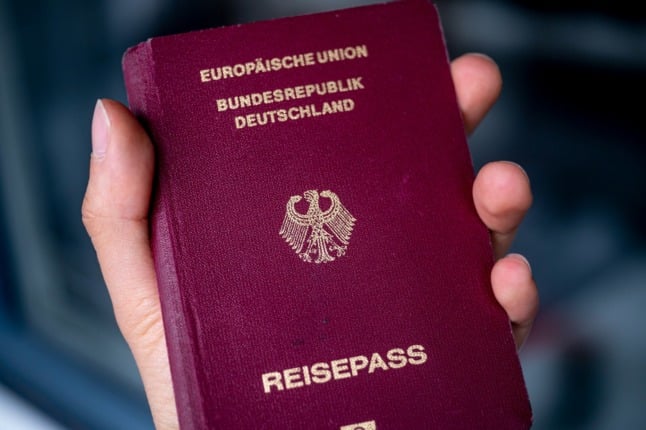In the run-up to the German federal election in 2021, The Local reported on political parties’ stances on multinationality, and the chances that more liberal citizenship plans would survive coalition talks in various constellations.
At the time, it seemed like a long shot – only a couple of the many possible coalitions agreed on the question, and it appeared like a niche piece of legislation likely to be lost in horse-trading over more hot-button issues like climate, transport and housing.
However, as the prospects of the so-called Ampel – traffic light – coalition solidified, Germany’s international community (including readers of The Local) found itself watching the talks with bated breath – perhaps Germany really could relax its strict citizenship and naturalisation happen.
And on November 24th 2021, Denglisch Twitter – and beyond – exploded in delight. Despite having to wrangle hundreds of pages of party programmes with wide-ranging priorities, the Social Democrats (SPD), Greens and Free Democrats (FDP) revealed that they hadn’t forgotten the citizenship issue in their months of negotiations.
For all you model Ausländer wondering what the Koalitionsvertrag says about dual citizenship:
"Wir schaffen ein modernes Staatsangehörigkeitsrecht. Dafür werden wir die Mehrfachstaatsangehörigkeit ermöglichen und den Weg zum Erwerb der deutschen Staatsangehörigkeit vereinfachen."— Tori Boeck (@toriboeck) November 24, 2021
In the final draft of the coalition contract, under the section Equality and Diversity (Gleichstellung und Vielfalt), stood a few clear-eyed paragraphs announcing the intention to embrace a more modern immigration and citizenship policy.
READ ALSO: What Germany’s new government means for citizenship and naturalisation
The coalition said there would be simpler and faster paths to naturalisation – in most cases after five years (instead of eight), and in cases of exceptional integration after three years, with permanent residency also available in standard cases after three years.
And the biggest paradigm shift: an end to Germany’s long-held aversion to multi-nationality.
Despite a patchwork of loopholes for EU citizens, nationals of states which disallow renunciation, and other third-state nationals creatively cobbling together arguments for hardship exceptions, Germany’s fundamental stance was, until now, to avoid dual citizenship whenever possible.
Under the new government, however, multinationality will be recognised and accepted on principle, both for children born in Germany, who will no longer have to choose one passport, and for first-generation immigrants.
When can we expect the law to be changed?
After the celebration subsided, however, many questions remained: when will this intention crystallise into law? Is it a sure thing? We reached out to experts in all three parties for comment.
Regarding the timeframe, it’s rare that significant reforms make it from drawing board to law-of-the-land in a matter of a few months, but what about years? Can immigrants count on dual citizenship in the next one to two years, or will it be further down the road?
READ ALSO: How I got German citizenship – and how you can too
The politicians from the three different coalition parties we spoke to stopped short of pinning down the specific timeline. But all three reinforced their commitment to pushing the reform through parliament as quickly as possible, with signs it will be one of the “first big projects” of the government.
Filiz Polat, member of the Bundestag and Green Party spokesperson for migration and integration policy, spoke about the atmosphere of momentous change afoot in the new coalition.
“Our intent as Green parliamentary group, and I think we’re united in this with our coalition partners in parliament, is to encourage the new Federal Minister of the Interior [Nancy] Faeser to implement this (citizenship and immigration changes) as one of the first big projects,” said Polat.

“No small number of people in Germany have already been waiting a very, very long time for the possibility of naturalisation with acceptance of multinationality,” Polat emphasised.
Dr. Karamba Diaby, Integration Commissioner of the SPD parliamentary group, and like Polat a member of the relevant negotiation team during coalition talks, agreed with this assessment.
“The corresponding ministry will certainly get to work without delay,” said Diaby. “I am confident that we will do it this legislative period (four years), as swiftly as possible.”
Stephan Thomae, Vice Chairman of the FDP parliamentary group, pointed out the binding nature of the coalition contract as a mandate to produce according legislation, meaning that it is certain to happen.
“The parliamentary groups will ensure that this reform doesn’t disappear into a drawer somewhere,” he said.
Previously, the FDP had spoken to The Local about the critical need for a sea change in immigration policy, to attract more workers, revitalise the labour market and keep the pension system afloat.

Christian Dürr, now Chairman of the FDP’s parliamentary group, criticised the way that complicated laws and mountains of paperwork sabotage efforts to encourage immigration.
In his first speech on the Bundestag floor during the new legislative period, Dürr reiterated the commitment of the traffic light coalition to transform Germany into an open, modern society of immigration.
The universal recognition of multiple citizenships is a key part of that vision. “Multinationality makes it possible for many people to retain their personal and cultural ties to their homeland,” added Dürr’s FDP colleague Thomae.
“It also avoids the incursion of legal repercussions that can be connected with renunciation of the old citizenship, such as with inheritances or property ownership. Above all, it should remove barriers to becoming German.”
Overcoming decades-long blockades
Polat and Diaby also contextualised the significance of this impending legislation, as successor to the reform in 2000 under the last SPD/Green federal government formation, which ended the primacy of jus sanguinis (a rule that means a child’s citizenship is determined by their parents’ citizenship) and advanced the principle of jus soli (gives the right of anyone born in the territory of a state to nationality or citizenship).
In the subsequent decades, resistance by the governing conservatives prevented their partners in the SPD and FDP from continuing with further significant liberalisations.

“I’m truly glad that we have succeeded in overcoming, with the coalition contract, this blockade that existed under the previous coalition partners, that we have made a clear commitment to dual citizenship,” said the SPD’s Diaby.
“We’re going a step further, we’re not just strengthening the principle of jus soli, we also want to do justice to our status as a society of immigration, by recognising and making multi-nationality possible,” added Polat, of the Greens.
It hasn’t been an easy road. “There were always social and political confrontations regarding the nationality law, precisely because it is an expression of what it means to embrace a society of immigration,” elaborated Polat. “Germany, or a part of Germany, especially on the conservative side, has always struggled immensely with this, and still does, one must say.”
Sweeping changes
But despite this pushback, Polat sees a clear mandate to the newly elected coalition from a society which increasingly supports immigration and diversity, to pursue and implement progressive citizenship policy.
“Not just in the interest of those who themselves have migrated and their children, but also as an advantage for Germany, an exporting country, a key player within the European Union, and in the ever-further globalising world,” said Polat.
The shift in federal policy will bring sweeping changes for many demographics – from children born in Germany, to ageing alumni of guest worker programmes, to third-state nationals immigrating to Germany today.
“The possibility of retaining both passports is already a matter-of-course for EU citizens, and is an expression of a unified Europe,” Polat pointed out.
For her, the discrepancy is a clear argument for universally permitting multi-nationality, “for all people who have also become part of this society, who have lived here a long time and already meet the prerequisites for naturalisation, but consciously choose not to become citizens, because they would have to then renounce their original citizenship”.
Children with at least one parent residing legally in Germany for five years or more will become German citizens at birth. “We will definitely abolish the previously existing compulsory choice between citizenships,” said Diaby.

‘You belong to Germany’
Adding to the sense of urgency is the need to pass legislation in time to make a difference for more senior immigrants.
“This impacts many members of the so-called ‘guest worker’ generation, which is also, so to speak, quite old, at least the first generation,” said Polat.
“For those who have a considerable interest in being able to be naturalised with retention of multi-nationality, this would also be a special recognition of their lifelong contributions.”
Equally impacted and often forgotten are the former contract workers of East Germany, who held a similar role to the guest workers in the West, pointed out Diaby.
“We want to send the message to people, you belong, you can become citizens, the requirements aren’t so strict anymore,” he said.
READ ALSO: EXPLAINED: How German citizenship differs from permanent residency
Keep an eye on thelocal.de for further articles on how foreigners are affected by these planned changes, and your thoughts on relaxing citizenship laws.



 Please whitelist us to continue reading.
Please whitelist us to continue reading.
Member comments